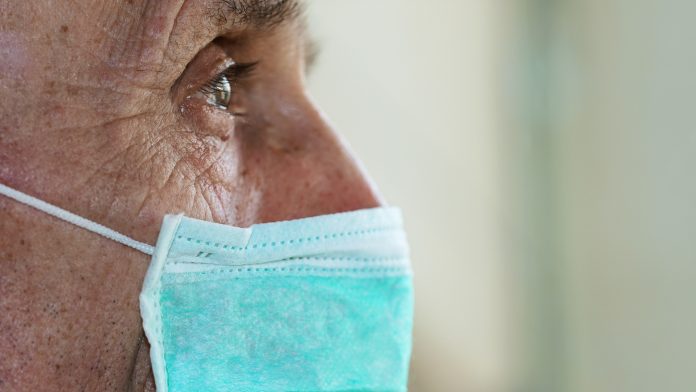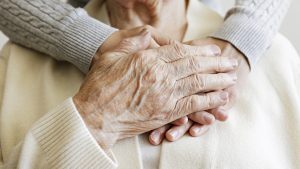
Lorna Rothery spoke to Dr Carolyn Wilson-Nash following her study on the impact of the COVID-19 pandemic on vulnerable adults and family caregivers.
A new study from the University of Stirling has shed light on the negative experiences of family caregivers and vulnerable older adults during the COVID-19 pandemic. Dr Carolyn Wilson-Nash analysed 2607 posts on forums for UK-based family caregivers between March 15 and September 15, 2020, and said caregivers felt “powerless, voiceless and choiceless” due to the lack of communication with family members regarding older relatives, and the marginalisation of vulnerable groups caused by overwhelmed and fragmented health services.
Despite healthcare staff working tirelessly and endeavouring to adhere to COVID regulations, issues such as premature discharge into the community without care, the closure of non-emergency services and the changing of medical records of vulnerable older people without the family’s consent were all cited as reasons that negatively impacted people’s experience of care.
To discuss the study in more detail, and the solutions required to ensure health systems can efficiently meet the needs of vulnerable adults and carers, Lorna Rothery spoke to lecturer in marketing and retail at the University of Stirling, Dr Carolyn Wilson-Nash.
How did your study come about and what were your key aims?
The research was originally in response to the increase in family caregivers in the UK and it intended to examine their role in managing the health and social care of vulnerable older people. I was therefore collecting data from public forums on caregiving when the COVID-19 pandemic began in March 2020. The data on the forums changed overnight and there appeared to be many concerns, issues, and anxieties from family caregivers in relation to the health and wellbeing of their care receiver from the uncertainties that the pandemic posed. These observations, therefore, led to changes in the research.
From this, the study aimed to explore how family caregivers of vulnerable older people experienced healthcare services in the UK, how this experience was affected by the pandemic and how healthcare services, providing care for older people and liaising with family caregivers, can improve the service experience, especially during times of crisis.
Can you outline how the COVID-19 pandemic response negatively impacted the welfare of vulnerable older adults and their carers? Were there any particularly surprising findings over the course of your research?
Many family carers felt powerless, voiceless and choiceless when navigating the healthcare of older people during the first six months of the pandemic. Powerlessness was experienced when healthcare organisations created rules and restrictions that the carer and older person had no control over. For example, when the UK government announced prioritising care for less vulnerable people, do not resuscitate (DNR) was placed on older people’s medical records without consent from the individual or the family.
When issues arose in the healthcare service, carers felt unable to voice their concerns as frontline employees, who were overworked and stressed, did not listen. Furthermore, in stretched and pressured healthcare services, the ordinary channels for customer communication were the first to be unprioritised and consequently shut or slowed down. The NHS, for instance, centralised the complaints procedure, resulting in complaints to GPs and hospitals taking months and service users feeling voiceless.
The reason that carers and older people endure being powerless and voiceless is due to the limited choice of alternative healthcare services. In the UK, primary or secondary healthcare services depend on the location of the consumer, and other private care such as in-home care services are in high demand, creating scarcity. This was exacerbated during the COVID-19 pandemic when people were being kept out of the hospital, leading to further pressure on community care and residential homes.
Surprising findings include how healthcare services suddenly stopped providing care to vulnerable older people during the pandemic, despite the high need for healthcare and scarcity of alternatives, leaving the carer in a difficult situation. Older people were being prematurely discharged from the hospital in poor conditions and without support at home. Others were evicted from care homes and given a 30-day notice period. Whilst some in-home care companies were withdrawing their services due to not being able to meet the high demand. This left older people in vulnerable situations, without any care, and the family carers feeling helpless, stressed, and resentful.

Family caregivers should not only receive substantive financial support but also emotional support and opportunities for training. They should receive clear communication from healthcare services and be involved in care planning, especially if they have power of attorney.
How could the issues that vulnerable older adults and their carers faced have been mitigated?
As a country, the UK should have been better prepared for a crisis. Just before the COVID-19 pandemic, the country was spending only 9.8% of GDP on healthcare, which is one of the lowest in the developed world, and only had a bed capacity of 2.5 per 1000 people. Therefore, when the pandemic hit, the NHS frontline services were rapidly overwhelmed and they responded by postponing non-emergency procedures, closing non-emergency services, and redeploying specialists, which released necessary hospital beds. Unfortunately, these actions had negative consequences for older people and their carers. Issues relating to scarcity of services and premature discharge could have been mitigated if there were a higher number of beds, healthcare professionals, and healthcare organisations, across public and private care, including GPs, hospitals, in-home caregivers, and care homes.
What actions could have been taken at a policy level during the early stages of the COVID-19 pandemic?
The response at policy level could have been faster and clearer. There needed to be clearer hygiene and safety guidelines for all healthcare organisations to follow, which involved the use of PPE, regular washing, and sanitising. These guidelines should have been implemented quickly and through effective communication channels. The supply of PPE needed to be speedier and spread not only across hospitals but also to in-home care companies and care homes. There also needed to be efficient and effective emotional support for frontline healthcare professionals, and adequate staff to prevent people from working unacceptably long hours.
Finally, autocratic decisions such as placing DNRs on medical records, changing the patient discharge protocol, and closing down complaints procedures should never have happened. This takes away people’s voices and rights and has devasting repercussions for those who are already vulnerable in healthcare services.
Given that the NHS is currently facing the worst staffing crises in its history, what do you feel should be the key priorities to better protect vulnerable older adults and their carers accessing health services?
Moving forwards the family carers of vulnerable older people need to be further recognised in their role. They are often responsible for navigating all the different healthcare services and ensuring that older people are safe and well, which can be extremely time-consuming. Family caregivers should therefore not only receive substantive financial support but also emotional support and opportunities for training. They should receive clear communication from healthcare services and be involved in care planning, especially if they have power of attorney.
The scarcity of services in the community should also be addressed, such as the high demand for in-home care services and care homes. Business loans could be provided for private organisations setting up care services, and further financial support could be provided to care services run by local authorities. If there was more care available, then people would receive the level of care they needed, preventing hospital admissions, and it would allow older people to be safely discharged from the hospital.
Finally, there needs to be more cohesion among those who care for vulnerable older people, across primary, secondary and care services. At the moment, the system is too fragmented with GPs, hospitals, care homes and care services not easily communicating with each other. If this communication was improved, it would prevent patients from being prematurely discharged without suitable care and support. Furthermore, services providing healthcare (e.g. in-home care companies, nursing homes and care homes) should legally not be able to withdraw their care during times of crisis. In regular circumstances, the withdrawal of care should only be allowed once the older person has found suitable alternative care.
Dr Carolyn Wilson-Nash
Lecturer in Marketing & Retail
University of Stirling
http://www.stir.ac.uk/
https://www.linkedin.com/in/carolyn-wilson-nash-28795299/?originalSubdomain=uk
https://twitter.com/drcags87
This article is from issue 22 of Health Europa Quarterly. Click here to get your free subscription today.










